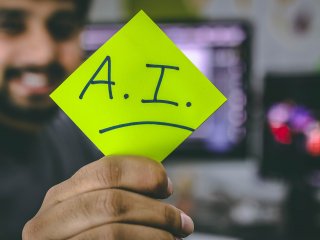Posted November 24th, 2020
By Guest Blogger
Undoubtedly, AI and automation can drive job creation and business growth. But they can also displace entire job categories. According to a report by McKinsey, about 60% of occupations could be automated.
When it comes to your career development, you shouldn’t leave anything to chance. A good way to future-proof your career is to stay one step ahead of the tech industry.
Instead of wondering whether a robot can do your job, it’s better to ask yourself how you can help a robot do its job.
Show Your Value in New Ways
Your role will eventually go away if your job is doing something reproducible or algorithmic. Take a closer look at the tasks you perform now and how you perform them. Be the one who will suggest automation improvements.
You can provide great value to your organization if you are the one who can make processes more efficient. By learning how to make automation work, you will become in charge of rolling it out and maintaining it.
Consider expanding your current role by adding a new skill to your skillset. For instance, if you work as a developer in IT, you can learn more about cybersecurity and become a security-proficient developer.
Work on Your Emotional Intelligence
Emotional intelligence, also called emotional quotient or EQ, is a uniquely human skillset. Your emotional intelligence dictates your ability to understand other people, how to work with them, and how to influence them.
Ultimately, people want to interact with one another. They don’t want to follow machines, figuratively or literally. In the future, the emotional intelligence of a person will likely become more valuable than their IQ.
Even today, in most industries and businesses, people with high emotional intelligence have a greater chance of achieving long-term success.
Self-awareness, self-regulation, social skills, and social awareness are some of the main components of emotional intelligence.
You will never be able to learn how to process data faster than an AI machine. But emotional intelligence is something you can learn, develop, and enhance.
So, in a workplace where AI is automating more and more roles, how exactly can you use emotional intelligence to your advantage?
Let’s say you are a customer service rep and your company is looking to employ AI-powered chatbots to automate some of your key roles. Instead of feeling threatened, you can use this opportunity to your advantage.
Chatbots and virtual assistants can provide generic answers to FAQs, and they can sift through data and find information much faster than we can. But, they still lack that human touch.
Human-to-human conversations can create connections that significantly boost the overall customer experience. AI assistants can handle less-complex queries for you as well as quickly provide you with the information you need to handle more complex ones. However, they can’t understand the nuances of human emotion.
This is where you can really demonstrate your value to your organization. You can use the power of emotional intelligence to recognize how the customers feel and manage your interactions accordingly, demonstrate empathy, handle stressful situations, and forge deeper bonds with customers.
By doing so, you will prove that you are a key player in improving the customer experience of your company.
Develop Your Soft Skills
Even though emotional intelligence is one of the strongest predictors of success, you need to develop other soft skills as well in order to future-proof your career.
So, what exactly are soft skills? They are non-technical skills that relate to how we work. Soft skills include critical thinking, time management, leadership, interpersonal communication, dependability, adaptability, conflict resolution, etc.
We also call these “transferable skills” because they are not tied down to certain occupations. Hard skills, on the other hand, are the technical, job-specific skills we learn at work or university.
Hard skills are ever-changing, while soft skills are relatively consistent. Hard skills will remain important, but you will always need to learn new ones in order to remain relevant.
As automation moves forward, hiring managers will show even more appreciation for candidates’ soft skills.
Hard skills can make you an expert in your field, but they don’t necessarily make you a good employee. Soft skills make you easy to work with. In the future, your soft skills may determine whether a company will want to invest in you.
Robots will be able to do even more things than they are able to now, but they won’t become successful at imitating soft skills anytime soon. A sure way to stand out from the automated crowd is to work on your soft skills.
Nurture Curiosity and Flexibility
Last but not least—employees who are willing to try completely new areas and break out of their comfort zones will have a competitive edge in the age of automation and AI.
As AI continues to revolutionize the workplace, curiosity and flexibility become increasingly important. You need to be on a constant quest to deliver a higher level of value if you want to build a long, prosperous career.
About the Author: Michael has been working in marketing for almost a decade and has worked with a huge range of clients, which has made him knowledgeable on many different subjects. He has recently rediscovered a passion for writing and hopes to make it a daily habit. You can read more of Michael's work at Qeedle.





